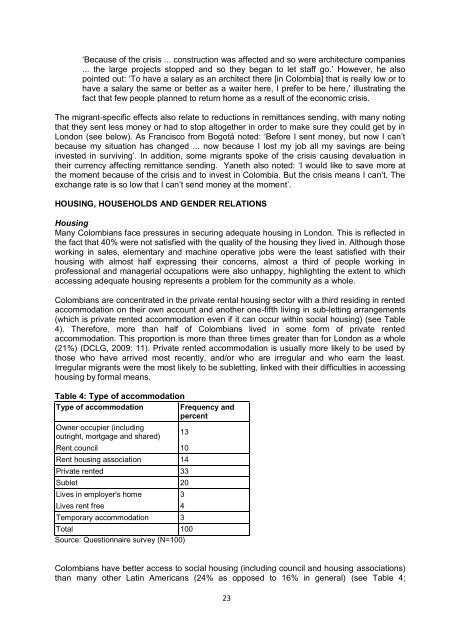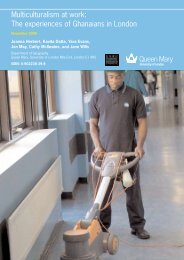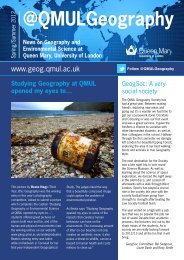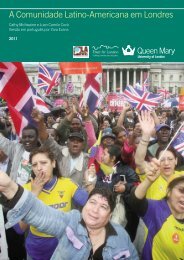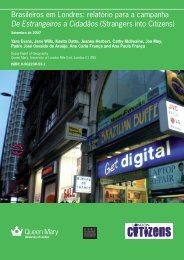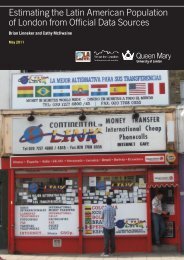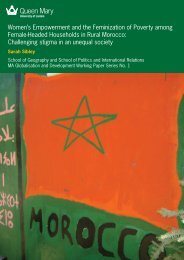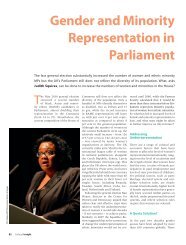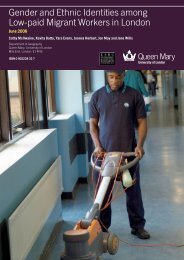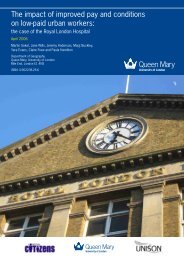The Colombian community in London - Geography - Queen Mary ...
The Colombian community in London - Geography - Queen Mary ...
The Colombian community in London - Geography - Queen Mary ...
- No tags were found...
You also want an ePaper? Increase the reach of your titles
YUMPU automatically turns print PDFs into web optimized ePapers that Google loves.
„Because of the crisis ... construction was affected and so were architecture companies<br />
... the large projects stopped and so they began to let staff go.‟ However, he also<br />
po<strong>in</strong>ted out: „To have a salary as an architect there [<strong>in</strong> Colombia] that is really low or to<br />
have a salary the same or better as a waiter here, I prefer to be here,‟ illustrat<strong>in</strong>g the<br />
fact that few people planned to return home as a result of the economic crisis.<br />
<strong>The</strong> migrant-specific effects also relate to reductions <strong>in</strong> remittances send<strong>in</strong>g, with many not<strong>in</strong>g<br />
that they sent less money or had to stop altogether <strong>in</strong> order to make sure they could get by <strong>in</strong><br />
<strong>London</strong> (see below). As Francisco from Bogotá noted: „Before I sent money, but now I can‟t<br />
because my situation has changed ... now because I lost my job all my sav<strong>in</strong>gs are be<strong>in</strong>g<br />
<strong>in</strong>vested <strong>in</strong> surviv<strong>in</strong>g‟. In addition, some migrants spoke of the crisis caus<strong>in</strong>g devaluation <strong>in</strong><br />
their currency affect<strong>in</strong>g remittance send<strong>in</strong>g. Yaneth also noted: „I would like to save more at<br />
the moment because of the crisis and to <strong>in</strong>vest <strong>in</strong> Colombia. But the crisis means I can‟t. <strong>The</strong><br />
exchange rate is so low that I can‟t send money at the moment‟.<br />
HOUSING, HOUSEHOLDS AND GENDER RELATIONS<br />
Hous<strong>in</strong>g<br />
Many <strong>Colombian</strong>s face pressures <strong>in</strong> secur<strong>in</strong>g adequate hous<strong>in</strong>g <strong>in</strong> <strong>London</strong>. This is reflected <strong>in</strong><br />
the fact that 40% were not satisfied with the quality of the hous<strong>in</strong>g they lived <strong>in</strong>. Although those<br />
work<strong>in</strong>g <strong>in</strong> sales, elementary and mach<strong>in</strong>e operative jobs were the least satisfied with their<br />
hous<strong>in</strong>g with almost half express<strong>in</strong>g their concerns, almost a third of people work<strong>in</strong>g <strong>in</strong><br />
professional and managerial occupations were also unhappy, highlight<strong>in</strong>g the extent to which<br />
access<strong>in</strong>g adequate hous<strong>in</strong>g represents a problem for the <strong>community</strong> as a whole.<br />
<strong>Colombian</strong>s are concentrated <strong>in</strong> the private rental hous<strong>in</strong>g sector with a third resid<strong>in</strong>g <strong>in</strong> rented<br />
accommodation on their own account and another one-fifth liv<strong>in</strong>g <strong>in</strong> sub-lett<strong>in</strong>g arrangements<br />
(which is private rented accommodation even if it can occur with<strong>in</strong> social hous<strong>in</strong>g) (see Table<br />
4). <strong>The</strong>refore, more than half of <strong>Colombian</strong>s lived <strong>in</strong> some form of private rented<br />
accommodation. This proportion is more than three times greater than for <strong>London</strong> as a whole<br />
(21%) (DCLG, 2009: 11). Private rented accommodation is usually more likely to be used by<br />
those who have arrived most recently, and/or who are irregular and who earn the least.<br />
Irregular migrants were the most likely to be sublett<strong>in</strong>g, l<strong>in</strong>ked with their difficulties <strong>in</strong> access<strong>in</strong>g<br />
hous<strong>in</strong>g by formal means.<br />
Table 4: Type of accommodation<br />
Type of accommodation Frequency and<br />
percent<br />
Owner occupier (<strong>in</strong>clud<strong>in</strong>g<br />
outright, mortgage and shared)<br />
13<br />
Rent council 10<br />
Rent hous<strong>in</strong>g association 14<br />
Private rented 33<br />
Sublet 20<br />
Lives <strong>in</strong> employer's home 3<br />
Lives rent free 4<br />
Temporary accommodation 3<br />
Total 100<br />
Source: Questionnaire survey (N=100)<br />
<strong>Colombian</strong>s have better access to social hous<strong>in</strong>g (<strong>in</strong>clud<strong>in</strong>g council and hous<strong>in</strong>g associations)<br />
than many other Lat<strong>in</strong> Americans (24% as opposed to 16% <strong>in</strong> general) (see Table 4;<br />
23


